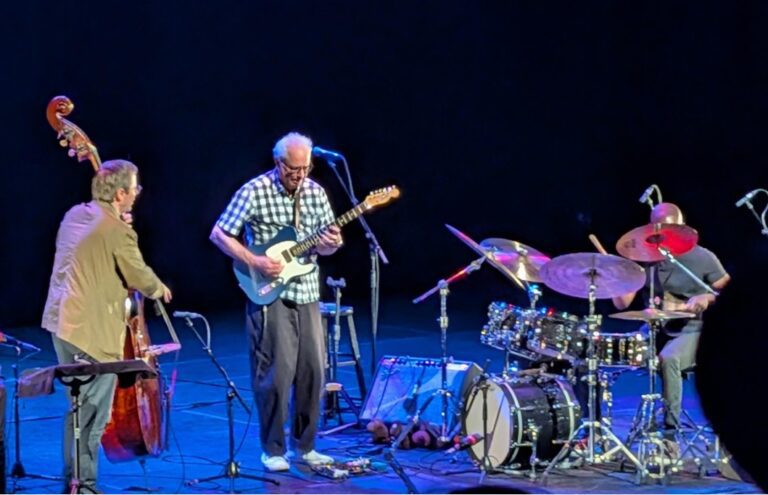If you were to ask a jazz musician to describe what it’s like to play in a trio they would likely answer “exposed.” When there is suddenly one rhythm instrument, one bass instrument, and one instrument covering melody and harmony, (or at least implying harmony), each musical decision and interaction carries more weight.
However, with that exposure also comes more freedom to move in and out of different roles. The drums could look to play melodically with careful drum selection and tuning; the bass could look to play full chords; and the guitar could look to establish a groove with dead muted notes. And in addition to all that, polyphonic moments from all involved also become a tasteful possibility.
Bill Frisell, Thomas Morgan, and Rudy Royston achieved these various feats (and others), as they blurred the lines of their instrument’s roles from one moment to the next. And it was fantastic to see.
During the opening song, we saw a prime example of polyphony in action as the trio played a jaunty and groovy tune. The bass and guitar played up and down their necks, inventing various lines and counterlines on the major scale.
This was after Frisell gave us an intro consisting of harmonics and a loop pedal. At various moments, things turned on a dime with moments of pointillistic dissonance, sections of blues rock, fuzzy 70s style rock, and sweet ballads all being played in quick succession.
Personally, my favourite selection of the evening was Billy Strayhorn’s “Isfahan” which Frisell interpreted with bluesy licks here and there.
Truly, my biggest takeaway from the evening was the decades spanning musical experience of this trio. In the moments where the music devolved into rock from a shuffle or swing, for example, it dawned on me that lesser players might try the same thing and have it sound like a cheap gimmick if unschooled in the genres. At seventy-four, however, Frisell experienced much of this music as it was being developed.
Rock, and post-bop for example, were being developed in his lifetime, and he internalized them sincerely and legitimately as a consequence, it seems to me. Incidentally, one of my favourite Frisell albums is Guitar in the Space Age! (2014) in which he interprets various ’60s selections in his unique way.
Indeed, on full display the entire evening was the trio’s experience where musical choices, and interactions were concerned, but so too was their wealth of knowledge of jazz and rock and their ability to fuse the genres with ease.
























